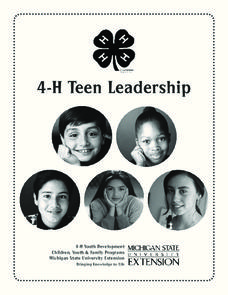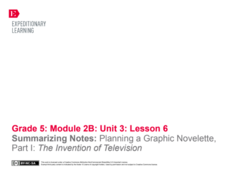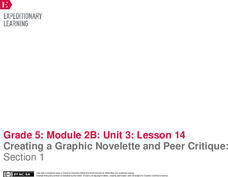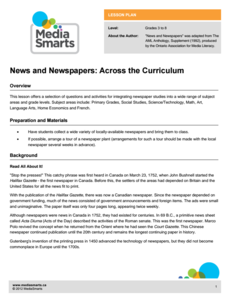Core Knowledge Foundation
Volume 1 - A History of the United States: Precolonial to the 1800s
Volume One of the 299-page Core Knowledge History of the United States covers events from the Precolonial Period to the 1800s.
Michigan State University
4-H Teen Leadership
Take your 4-H teens to the next level! Help them learn how to be an active part of their communities with a teen leadership development unit. Individuals, together with school and community partners, create and execute a service-driven...
National Research Center for Career and Technical Education
Break-Even Point
How do companies determine the prices of their products? Marketing maestros discover the concepts of cost and break-even point through discussion, independent practice, and a collaborative assessment. The career and technology-oriented...
Curated OER
Our “Civilized” Society
The Scarlet Letter is the anchor text in a four-week unit that examines Hawthorne's novel through the lens of the intolerances found in a supposed civilized society. In addition to their reading, class members watch clips from TV shows,...
EngageNY
Summarizing Notes: Planning a Graphic Novelette Part 1: The Invention of Television
What's the story? Learners create the first of four storyboards about the invention of the television, incorporating narrative techniques and descriptive details. Next, they offer and receive feedback by participating in a peer critique...
EngageNY
Creating a Graphic Novelette and Peer Critique: Section 1
Help the class put a plan in place. With the detailed resource, pupils plan the first section of their graphic novelettes about an invention, creating and labeling their pages. Next, they work with partners to give and receive feedback...
SRI International
Nanofiltration
How can everyone in the world have access to clean drinking water? Throughout the lesson, learners read about and listen to how water is filtered, what the filtration process removes, and the best ways to filter. They explore the...
SRI International
The Water Crisis
Water, water, everywhere, right? Wrong. Learners assess their own knowledge of water availability on Earth. Then, through a reading, a teacher-led presentation, and an activity, pupils learn about the importance of available clean...
Curated OER
Constructing Narrative from the Migrant Experience in Literature
Excerpts from John Steinbeck's The Grapes of Wrath and from John Fante's Ask the Dust, as well as a variety of primary source documents provide the background for an examination of the migrant experience from 1920-1945.
Media Smarts
News and Newspapers: Across the Curriculum
Did you know that the Chinese Court Gazette is the longest continuing news paper in history? In addition to some great background information, this resource includes suggestions for activities across grade levels and across the curriculum.
Anti-Defamation League
Identity-Based Bullying
What is identity? What is bullying? What is identity-based bullying? After discussing these questions as a class, pupils engage in partner discussions before participating in a small group activity to act out bullying scenarios. Then,...
Teach Engineering
Coordinates and the Cartesian Plane
The plot thickens to get a functional understanding. After a short review of plotting points on the coordinate plane, class members learn the difference between functions and relations in the second lesson in a series of nine. They show...
SRI International
Science of Water
Water is crucial to survival. Scholars gain an appreciation for water by reading about it, learning about its atomic properties, and investigating its properties through six stations in a lab activity.














